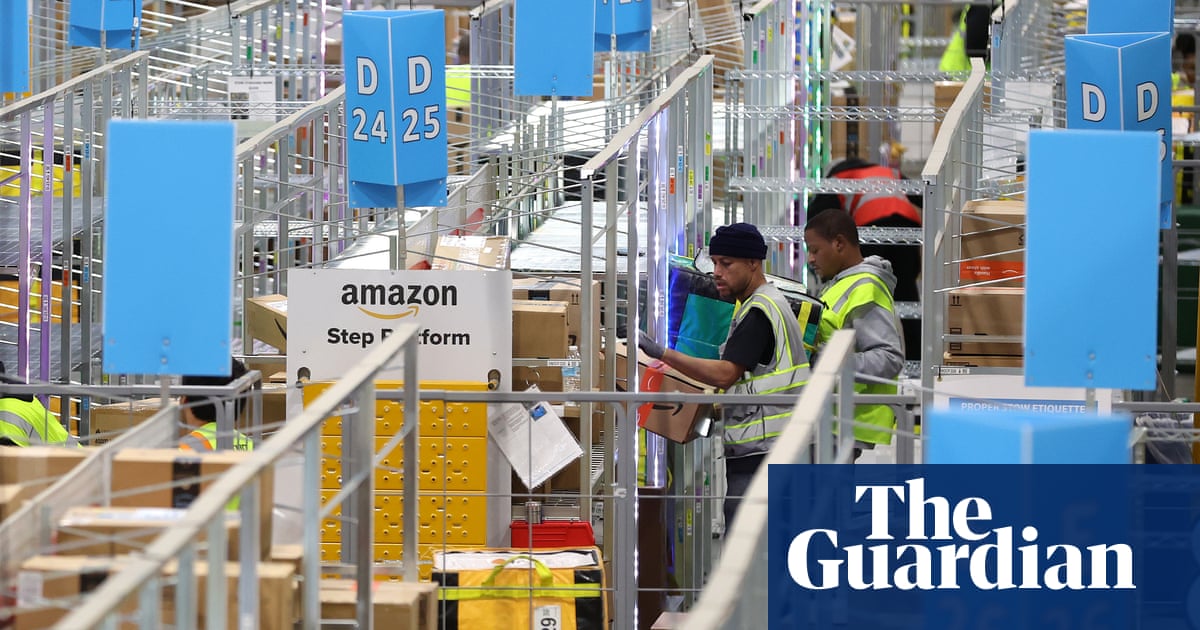
Workers at the Amazon warehouse in Bessemer, Alabama, have begun the rerun of a historic union election after the US labor regulator ruled Amazon’s conduct had interfered with a previous election in 2021 and ordered a new vote.
The union drive comes as other large US employers including Starbucks and Target are fighting off union drives. If successful, the warehouse would be the first Amazon facility to unionize in the US. Employees said that Amazon – which now employs more than 1 million people in the US – is fighting hard to make sure this vote also fails, but some are feeling more confident the second time around.
Darryl Richardson, an employee at the Amazon warehouse in Bessemer for two years, said workers and organizers are now more apt to resist Amazon’s union-busting efforts.
“They’re still using the same scare tactics they used last time, but due to the first election, you have employees who understand and know that Amazon isn’t telling them the truth,” said Richardson. “I feel better this time than I did the first time. Employees have been voicing their opinions and standing strong this election.”
More than 6,100 workers are eligible to vote in the union election, which will determine if workers will be represented by the Retail, Wholesale and Department Store Union (RWDSU). Due to high employee turnover, almost half of the eligible workers in this election were not working at Amazon during the first union election.
Ballots were sent to Alabama workers on 4 February, with ballots due to be returned by 25 March. Results will be tallied beginning on 28 March.
Two other Amazon warehouses, JFK8 and LDJ5 in Staten Island, New York, have filed petitions to hold union elections with the National Labor Relations Board (NLRB), though election dates have not been set by the NLRB regional director.
Perry Connelly, 59, who has worked in outbound stowing at the Bessemer warehouse for two years, said that organizing ahead of the first union election started off well, with a majority of workers signing union authorization cards, but that Amazon’s aggressive anti-union campaign and promises of improvements confused or deterred many workers from voting at all or persuaded them to vote against the union.
“We just want Amazon to be held accountable for all the things that make the job, the workplace, unbearable,” said Connelly. “What we do and what we put out, Amazon can pay a lot better and not have such a high rate of turnover of employees. A lot of people come in and they’re not there for six or seven months, they don’t make it that long because of the working conditions.”
Rerun union elections are relatively rare, with unions prevailing in a slim majority of those elections in recent years. But Connelly claimed this time around, there’s more support for the union. He said many workers switched from voting no in the first election to supporting it, because Amazon didn’t fulfill the promises they made during the first election, and the union organizing campaign has expanded to handing out union T-shirts, door-knocking efforts that weren’t possible earlier in the Covid-19 pandemic, and partnering with other local unions and community groups.
Connelly cited issues such as better pay, better promotional opportunities, more respect from management toward workers and less hostility toward productivity rates as a few of the reasons he is supporting the union.
“We’re not asking for a lot. We’re just asking for better conditions and less work hassle. We feel like we’re in a hostile work environment day in and day out,” said Connelly. “Working for Amazon, no one should be worried about paying bills when you work for a multibillionaire, and we just want what we think is fair.”
US businesses have fought hard against union drives in recent years. A 2019 report by the Economic Policy Institute found that 41.5% of employers had violated federal labor law in union election campaigns and employers spend about $340m annually on union avoidance, issues that have driven campaigns for federal labor law reforms to expand workers’ rights and steepen penalties for employers violating labor laws.
As part of the new election ruling, Amazon reached a settlement with the NLRB, agreeing to refrain from threatening workers with discipline or calling the police on workers engaging in union activity outside the warehouse. If Amazon is found to violate the settlement, the NLRB could more easily sue the company.
Amazon is once again aggressively opposing the unionization effort at the warehouse, with regular anti-union meetings where outside consultants and managers are encouraging workers to vote against the union. A worker at the Bessemer warehouse has already filed unfair labor practice charges with the NLRB against Amazon, alleging the settlement was violated because he claims management warned him about speaking with co-workers about the union.
During the first union election, Amazon installed a United States Postal Service mailbox in front of the warehouse, surrounded by signs encouraging workers to vote no in the election. That mailbox was a significant factor in the first union election being overturned by the NLRB. The union has already made a request for review to the NLRB of objectionable conduct over the mailbox, as it remains on site at the warehouse, but was just moved to a different location.
The union argued the mailbox undermined the election as it is subject to constant surveillance by the company, and the stigma surrounding the mailbox as employer-controlled remains. The NLRB ruled the claims would be resolved after the new election.
Contacted by the Guardian, Amazon did not comment on how its conduct this election has changed from the previous one.
A spokesperson said in an email: “Our employees have always had the choice of whether or not to join a union, and they overwhelmingly chose not to join the RWDSU last year. We look forward to our team in BHM1 having their voices heard again.”












